With friends like Joe Cortright, Transportation Commissioner Steve Novick doesn’t need enemies.
That’s the case Novick made this morning in a sharp response in the comments beneath a widely circulated column we published by Cortright, a local urban economist.
Cortright, who like Novick comes from a generally leftish perspective, had made eight arguments about transportation revenue in the context of Portland’s effort to create a new, local street fund. In the comment below, Novick raises thoughtful objections to two of them.
I have two main problems with what my friend Joe Cortright said in his recent column. First, he’s using generic arguments against a specific proposal while largely ignoring what the proposal actually is. Second, he’s adopting the rhetoric of his political opponents to attack spending on projects that he actually isn’t opposed to.
Joe says people should be suspicious of the word ‘safety.’ The implication is that since we’re talking about ‘safety,’ we must be planning to waste money. But what do we mean when we say we’re going to spend Street Fund money on ‘safety’? We’ve made it very clear that we mean sidewalks, crossing improvements, greenways, and other measures to make it safer for people to walk and bike. Joe acknowledges that in passing, but then warns that future City Councils should reallocate the money to something else. Well, by that logic, you should never send any tax money to government, because they might spend it on something you don’t like. That’s generic anti-tax right-wing logic. And if we follow that logic, there will never be any money for pedestrian and bicycle improvements.
Advertisement
Second, Joe – again sounding just like a right-wing online commenter, or the Oregonian editorial board – attacks the City for spending money on “shiny, big” new projects like Portland-Milwaukie light rail. But Joe doesn’t oppose light rail – nor does he oppose the streetcar, which actually costs PBOT more ($4.5 million a year). Moreover, the City’s investment in light rail is $2.5 million a year – significant, but not a large fraction of the PBOT budget. If Joe had said something that fully reflected both objective facts and what he actually believes (and I say this with confidence because I asked him what he actually believes), it would have been something like this: “Of course, I am a supporter of Portland-Milwaukie light rail, and the city couldn’t pave all its streets for $2.5 million a year. But given that the amount the street fee would raise is still not sufficient to address current maintenance needs, the City should not follow past practice and spend Street Fund money on major new capital projects like PMLR. Mayor Hales and Commissioner Novick’s commitment to spend 56% of the new funds on maintenance and 44% on pedestrian-and bike-oriented safety projects would seem to preclude such practices, if followed by their successors.” Instead, Joe uses the same simplistic rhetoric that anti-transit Tea Partiers would use.
So Joe – I’m one of your allies, and I’m trying to do exactly the kind of things you know need to be done. But you’re using the rhetoric of our common enemies to blast me. What sense does that make?
It’s worth noting that Novick doesn’t dispute the general theme behind most of Cortright’s piece: that the whole system would work better if we stopped subsidizing car use with free public parking and too-cheap gasoline.
Just the opposite, in fact — one week after Cortright’s piece, Novick and Mayor Charlie Hales seem to be taking steps to help raise gas taxes and allow cities to charge for public parking.
Yes, we pay for good comments. We’ll be mailing a $5 bill to Commissioner Novick (or to the charity of his choice, including the Portland Street Fund) in thanks for this great one. Watch your email, commissioner!

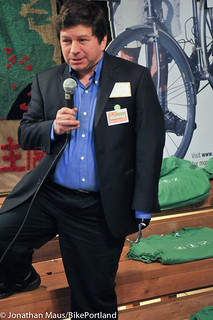
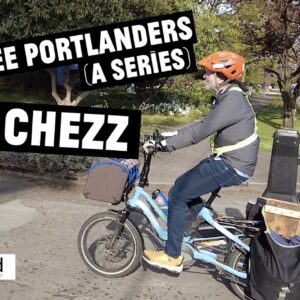
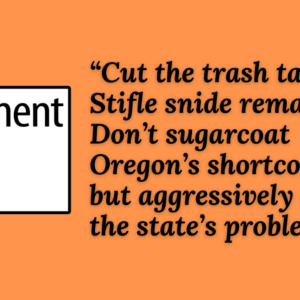
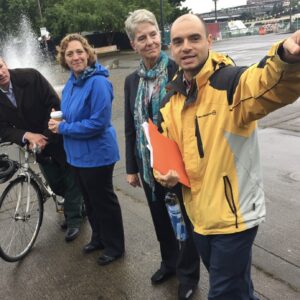
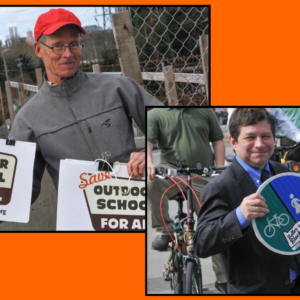
I thought it was great that Steve Novick posted a comment here. And think it also speaks very highly of bikeportland that it is now the platform where folks from all sides can (must?) weigh in.
And while we’re at it, I wish you would chime in here more, Steve N. It would benefit everyone, I think, if we could have more of a dialogue on these issues rather than guessing at what lies behind what can seem perplexing (to the other side); deepen our understanding of where the other is coming from.
It is sad to see Novick’s street fee go down this week without a vote. It has been eye opening to see all the people who should have been Novick’s allies in this fight hide behind various flimsy arguments. In the end we will all suffer without this investment.
The Lloyd district was set to receive over $4 million in bike and ped safety investment within 5 years of the fee. But I was the only person in the three committees I’m on full of people who say they “get” transportation investment that supported any of the street fee proposals.
What people refused to see is that transportation investments are in themselves more progressive than a progressive tax and that having a safe transportation system will make people get out of their cars faster than paying more for gas.
The lesson here is get three council members and just pass the thing.
“having a safe transportation system will make people get out of their cars faster than paying more for gas.”
Interesting.
Can you (a) provide support for this assertion?
And (b) what leads you to think that the Street Fee (I’m assuming we’re talking about v. 6.2(c) here?) would in fact deliver that safe (sic) transportation system you invoked?
This is too simplistic though. There were plenty of people in Portland who didn’t like this thing from a number of angles (and it’s not helpful to call them “flimsy”.
I would have loved to just see PBOT lay out the facts for the public. “We’re spending X amount of money on this and that a year, thus we need Y amount of money for the overage. We’ve clearly made budgeting mistakes in the past, but he’s what we’re going to do different going forward.”
They made a case for the Y, but did not publicize the X (or if they did I didn’t see it, and I’ve been paying pretty close attention to this). A lot of the city views PBOT as kind of a black hole of funding right now. And when people are apprehensive of your spending habits, it makes sense to level with them and try to win back your trust. From the meetings I went to and the articles I read, I got the impression of “Just give us more money and this time I swear we’ll use it better”.
That may be true in perception, and yes PBOT should lay out their budget in a way that is more transparent, but their budget is SO micro-managed that there is very little flexibility in anything….they do not even have a landscaping budget. One tree…nope, not money…..The project list that everyone thinks is so “squishy”..I found to be extremely detailed….down to the block of what would get paved. Almost too detailed I thought as there would be little to no flexibility…and then one change and the Oregonian would pounce…”PBOT goes back on their word!!! NO MORE STREET FEE”
I am sorry to point to the elephant in the room that I have seen for the last 15 years plus years I have been in Oregon and paying attention to politics. Oregonians are CHEAPSKATES. They want stuff, but will use every rational in the world not to pay any taxes. We are a low tax state with progressive politics….which makes for a very hard sell and always pits every program and issue against each other… few in this state actually will say I AM WILLING TO PAY MORE because it is needed. Everyone wants someone else to pay….Just ask some of the well off neighborhoods located aorund Hawthorn or Broadway about meters or permitted parking.
The resistance from someone making a over $100K a year to putting a few dollars in the meter so they can have the convenience to drive a mile to buy organic tomatoes….oh my…..If they can not admit the inherent problem with the public subsidizing of this, then how can we expect them to understand the reality of transportation funding? Hence it is city counsel’s JOB to just deal with it.
But sigh…this is Portland, where we need consensus for everything. NOT a way to run a city….it never works. It only create stagnation and gridlock.
I’ve lived in cities that did not function by consensus, where powerful interests freely ran over regular people. I’d take Portland over that any day.
You keep saying that we Portlanders don’t want to pay. Please give an example of one spending measure that wasn’t approved by the voters (remember we’re talking Multnomah county not Clackamas). Nearly everything that hits the ballots for our Libraries, Schools, and Parks passes. Heck, there are seldom even arguments against these things in the voters pamphlet, and when their are – the “yeahs” vastly outnumber the “nays”. As for transportation taxes like this one, it’s never come up like this before, so there is no history to base your assumption on.
We have high property taxes, which I’m fine with. As a property owner myself (who makes less than 100k a year), I gladly accept and vote for most the tax increases because it translates into greater valuation of my property (the biggest investment I have). Increases and improvements of civic services in the commons makes my house and property worth more with them than without them, and most smart property owners realize this. And most people realize that good roads and sidewalks are a huge factor in this equation.
The problem with the street fee wasn’t with the fact that it was a new fee or tax (take your pick – I don’t see any difference other than spelling), it was that its implementation as whole was poorly thought out and executed.
I could get into details over many specific problems I had with it, but really at this point (for now) that seems unnecessary. Though I can assure you that not a one of them is that I’m not willing to pay the improvements irt would have potentially brought.
I agree that PORTLANDERS will tax themselves …sometimes even if it is inherently unfair like the art’s tax…hence why city council should have in the FIRST PLACE realized that whatever they came up with would have to be put to the people…come up with the most viable, progressive solution and just do it…and pass it on for a vote. We should have voted on it last election. Their pandering to every group that spoke up is what killed it…incompetence through an attempt to achieve consensus where there would never be one.
I am also a home owner who has an income way below 100K. My property taxes compared to those in the Midwest are MUCH lower for a house of the value…I know it is very dependent, but I am comparing to (what used to be) high service states like Wisconsin and Illinois and similar cities. I checked….in Madison/Chicago my taxes would be almost double. This is exactly what I am talking about…our problem with property taxes is compression and the micro-managing of them that the Sizemore initiatives did in the 90’s.
Maybe the liberal mecca that is Portland agrees we need higher taxes, but our regressive income tax structure and our micromanaged property tax structures makes it impossible to more forward on real reform. Every avenue is blocked in some way….due to the low tax attitude STATEWIDE. You did not touch my comments on rich neighborhoods fighting meters tooth and nail on commercial stretches….it is not just the business owners who fight them.
But hey…even the Willamette Week has a right wind bias against statewide tax reform, so I doubt anything will change and we will continue to be 35th in the state per capita (or close) in taxes but want a system funded like it is in the top ten. Sorry…the numbers do not work.
http://www.blueoregon.com/2015/01/fairer-revenue/?fb_action_ids=10101820713467526&fb_action_types=og.comments
“Every avenue is blocked in some way….due to the low tax attitude STATEWIDE.”
Local gas tax?
I live one long block off of Hawthorne, and have spoken out in meetings to say I want me and all my neighbors to be charged for leaving our cars on the street, in my case 99% of the time. District or neighborhood parking permits for residents and businesses, meters for visitors. At some point, of it becomes expensive or aggravating enough, I’ll get rid of the #$%! car.
“The project list that everyone thinks is so “squishy”..I found to be extremely detailed”
Terry, that’s a fair point. But the question remains. People don’t trust a list (even a detailed list) from a group who clearly can’t figure out for themselves how the tax should be administered. Again, for an agency that has lost most people’s trust, this year long saga of switches and confusion has not helped their reputation at all.
And as the Oregonian pointed out yesterday, the city ran a pretty significant surplus last year, and with the streets in such dire shape, they still only gave a small fraction to PBOT, and very little to paving (was it even any?). This type of prioritization rubs people the wrong way. If this is such a crisis the council should be acting like it and doing everything they can to avert it.
I fail to see how subsidizing suburban drivers commutes into portland will get people out of their cars. The street fee if it ever comes back needs to do a better job of charging everyone who drives in portland, which is why the whole problem is better dealt with by charging a market rate for on street parking and taxing private parking lots.
Basically you want a toll on every road, since every jurisdiction should be collecting from every user. Just remember that on your drive out to ride on the Mackenzie River Trail or Sandy Ridge.
I’d probably use a state highway to get there. I am paying for those.
No, I think I stated my opinion pretty clearly that we should stop giving away parking, I didn’t mention tolls at all. It is difficult for portland to enact tolls due to regulations and logistics, but it is very easy for portland to stop giving away on street parking.
“But I was the only person in the three committees I’m on full of people who say they ‘get’ transportation investment that supported any of the street fee proposals.”
In the conversations you must have had with your colleagues on these various committees, what did you learn about their reasons for not supporting this effort? Did you find any of their arguments persuasive?
Novick from the mercury piece:
“we have no assurances that they will address any of these things specifically.”
Given our blue-dog governor, multiple blue-dog legislators, and a thin majority in the senate I personally think the chances of getting a significant gas tax passed is close to zero.
Yup. The state tax rate of 30 cents would need to go up 50% or more to match the revenue expected from the residential side. I think the odds of an increase that great are zero regardless of who’s running the show.
I’ve supported a local option gas tax for Portland since the beginning. At the Adams-Wheeler open houses conducted in 2008 or whenever it was, I stood up and told them I’d support a gas tax in any amount they proposed but that I was opposed to a “per residence” fee that they were proposing.
I argued then and I still think today that those who drive more should pay more. Those with bigger vehicles should pay more. A gas tax is a really close approximation to that.
Novick’s original proposal, with rates based on the Institute of Transportation Engineers’ Trip Generation was better than any of the subsequent iterations, but it was very poorly explained.
I hope the legislature gets the backbone necessary to implement a gas tax increase of meaningful magnitude. As I’ve stated on this forum before, adjusting for inflation using 1993 as the base, Oregon’s gas tax should already be 42 cents per gallon. Unfortunately, I doubt there is the political will to enact anything more than about 6 cents per gallon. And, I fear, like the 2009 measure, any state gas tax increase will also impose a moratorium of at least a few years on new or increased local option gas tax. If I’m right about that, it will mean that a local option gas tax will be off the table for Portland.
I hope I’m wrong and the legislature will pass a significant gas tax. And, I hope that Portland adds a few cents in addition in the fall.
Bikes are much better than cars at dodging potholes.
I spoke at the Transportations meeting where they were deciding whether to raise the gas tax 3 cents or 6 cents. I told them then, they should be considering whether to raise it $1 or %2. (no they didn’t listen to me) Now the reality is sinking in, they need those kinds of numbers to fix the current disrepair of our roads. It’s the legislators unwillingness to face the criticism for doing the right thing. I attended the Hales/Novick street fee town halls, never once was the gas tax a discussed option, it was always a residential street fee. They spent the evening pooh poohing the inefficient gas tax, while proposing ideas that were a direct subsidy for more drivers not paying.
They made their bed and now they must lie in it and it’s not very comfortable. I must it admit it’s been a circus to watch their street fee implode.
A staple rack made of square section tubing with a length of hardened chain threaded through tube would be cheaper and just as effective. The square section tube could not be cut with a tubing cutter and if a saw were used the chain would move with the blade and thereby resist cutting. Simple is good
This is your solution to the street fee?
I don’t think Portlanders should pay a single cent to Novicks street fund scheme. There is a lot of belly fat here in Portland that can be trimmed to fund the streets. Portland is rapidly becoming too expensive for the middle class. People like Hales and Novick want to attract out of state rich technies, leaving the rest of us who grew up in Portland to be forced out into the ghetto (the burbs). I will be voting Hales and Novick OUT come 2016.
I’ll be right behind you my friend.
“There is a lot of belly fat here in Portland that can be trimmed to fund the streets.”
We spend half a billion dollars each year on public safety. That is a heck of a lot of fat to cut! And if it were up to me it would be cut very, very aggressively.
https://www.portlandoregon.gov/cbo/65409
Steve, I confess to being less than happy with the street fee, tax or whatever you want to call it. And I don’t think I have ever voted against a tax of any kind. I think taxes, at least local ones, are some of the best values out there…libraries, parks, emergency response, etc. Money well spent. So what is my problem with a street tax?
For starts, I was disappointed that Hales ran for Mayor on a backward looking “pave the streets” platform. I know he knows better from his record in the 90’s, so its a shame he didn’t talk about growing our multimodal transportation system with a focus on non-auto travel. We all know that when more people walk, bike, and use transit, it frees up lane space for those who must drive for whatever reason. Why have you and the Mayor not made this speech over and over again to all the naysayers and championed an exciting and visionary transportation future?
And I guess I just don’t trust our DOTs, Oregon’s and Portland’s both. PBOT may be short of money, but it funds a lobbying group for freight interest who are perfectly capable of paying for their own staff. It reminds me of reactionary “white liberation” groups. They already have the Mayor’s phone number! And for all the talk about transportation options around here, the Options Division is still a step child of PBOT.
Time for PBOT to get creative: PDC money is available in Lents, Gateway, North Portland (Interstate URA) to pay for sidewalks, safety improvements, bikeways or whatever else (but not maintenance)…IF the case can be made that those expenditures will attract (leverage) private investment and stimulate economic growth. I think a first rate separated bikeway in the Williams corridor (Interstate URA) would do just that as well as the North Portland Greenway to and thru Swan Island (also Interstate URA). Other projects can be funded with SDCs and LIDs.
In the end if Salem raises the gas tax, a portion will go to localities, and Portland can dedicate that to the maintenance backlog, with a priority on arterials, just what Tom Miller did under Mayor Adams, and we can get back to creating the most cost effective transportation system out there for a the 21st century…one that is not built around private motor vehicles.
Oh, and more paid parking please!
A higher gas tax imposed simultaneously by both Oregon and Washington legislatures is the most rational idea–but asking state legislators to act with spine and intelligence is a little unlikely!